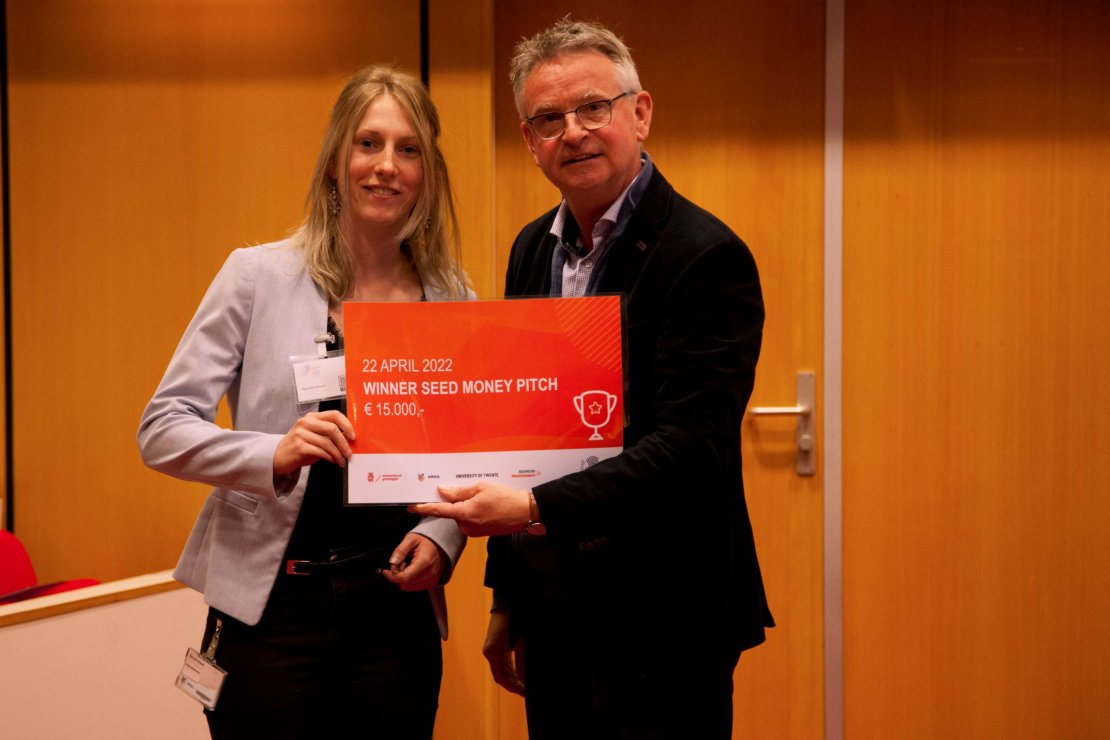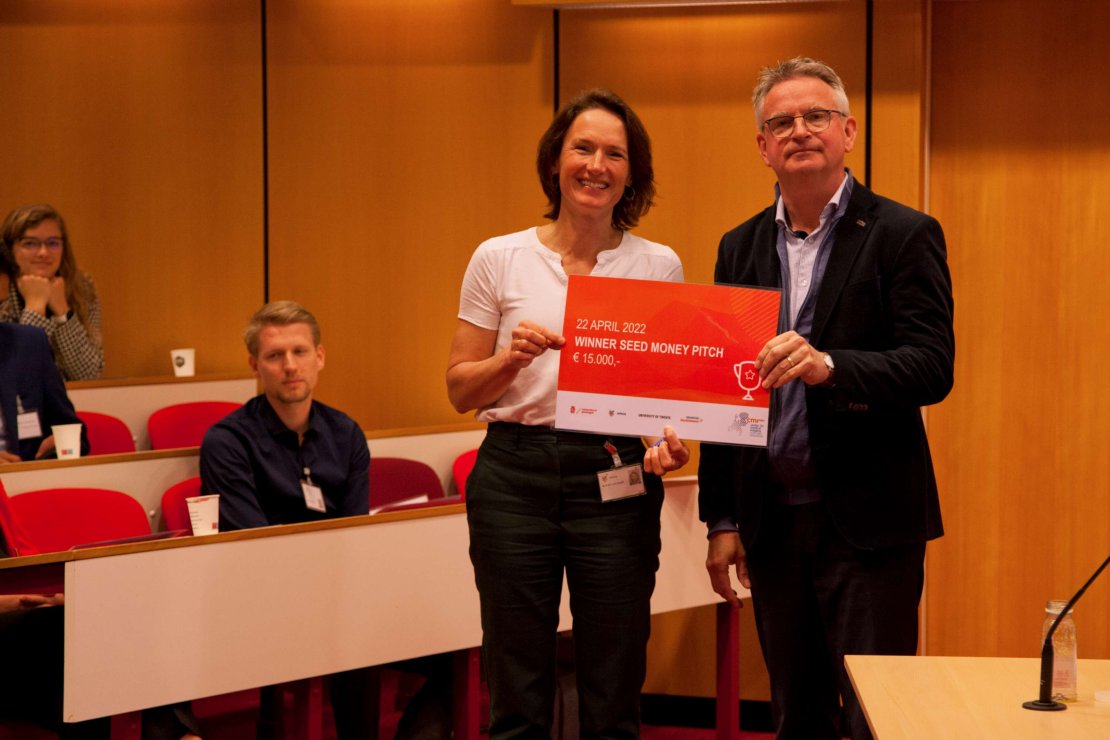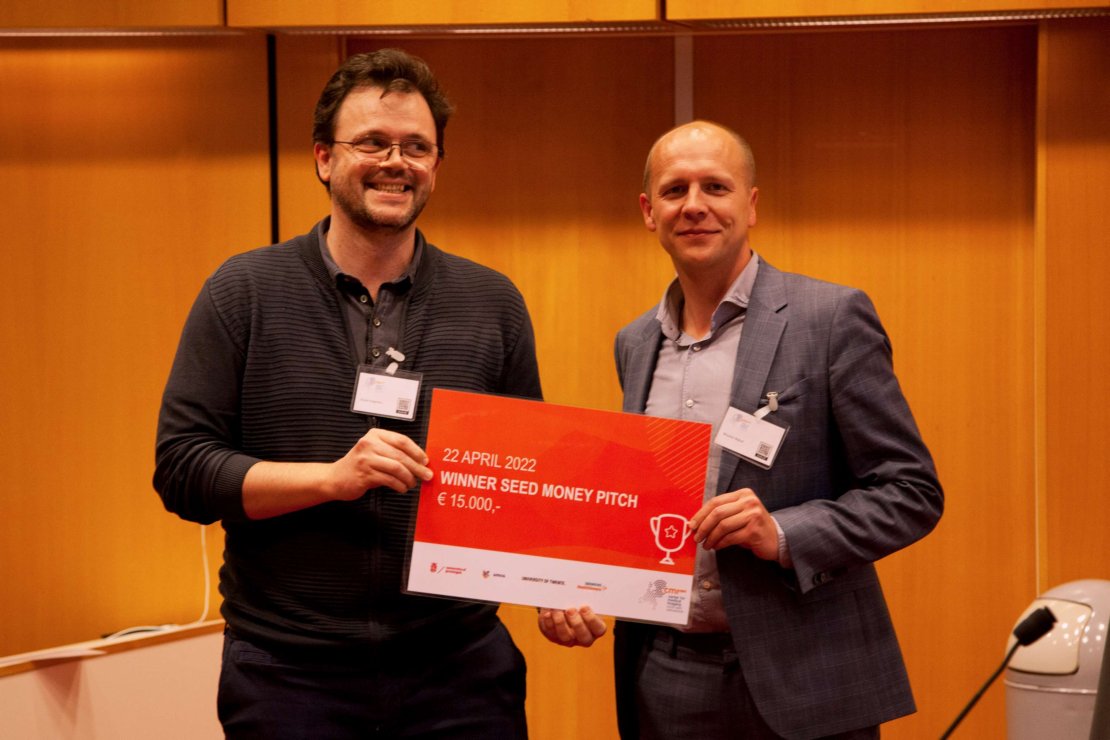CMI-NEN Symposium
On Friday 22 April, the Center for Medical Imaging North-East Netherlands (CMI-NEN) symposium was one of the first major physical meetings held at the UMCG. CMI-NEN is a consortium consisting of the University of Twente, RUG/UMCG and Siemens Healthineers. CMI-NEN focuses on 4 research areas: Medical (molecular) Imaging, Image-guided intervention, Data Science, and Health Technology Assessment (HTA). CMI-NEN simulates developments and validates new medical imaging and diagnostic techniques. In addition, it uses artificial intelligence (AI) and HTA to determine effectiveness in healthcare.
Nearly 100 participants had registered for the symposium and this took place in the "Rode zaal" of the UMCG. The morning program consisted of expert speakers in the CMI-NEN field, sharing information about the TechMed Centre in Twente, AI in medical imaging, experiences with the new total body PET (TBPET) within the MIC, sharing personal experiences with large European grants, an overview of biomaterials for imaging and therapy with an explanation of the role of Health Technology Research & Innovation Cluster (HTRIC). After lunch a tour of the NGMB department followed. The participants were informed about TBPET (Joyce van Sluis) GronSai (Janine Doorduin) and the production of PET radiopharmaceuticals (Gert Luurtsema). Simultaneously, projects on surgical-related medical imaging were demonstrated in the Blauwe Patio (Jean-Paul de Vries and Richte Schuurmann).
The afternoon program consisted of a large series of 12 short presentations (3 minutes + 2 minutes discussion) divided over the 4 research areas. This was presented by researchers from Groningen and Twente. The 2nd session of short presentations consisted of 8 selected research proposals submitted for the CMI-NEN seed-money awards. Each proposal concerned a collaborative project between Groningen, UTwente and Siemens Healthineers. These proposals were favored in advance by the CMI-NEN committee and the final score was determined by the final presentations of the 8 participants. A UMCG-RUG/UTwente/Siemens jury was available to appoint the 4 winners. The 4 winners each received 15,000 euros as a booster for their research project. For Imaging section the winner was Pascalle Mossel (Heart-on-chip to measure cardiac P-glycoprotein function using (18F)MC225 and PET imaging), for Image-guided intervention Giulio Dagnino (cooPerative smaRt cOnTrol for Endovascular robots (PROTEUS)), for HTA Thea van Asselt (Fast-MRI in prostate cancer: determining the broader benefits) and finally for the Data Science section Elina Thibeau-Sutre (AI-SURGE: Towards personalized AI-based treatment selection in colorectal cancer surgery).
The day ended with a matchmaking drink & snack to give everyone the opportunity to find common ground on joint research projects.
We look back on a very successful symposium and the next CMI-NEN symposium is already planned for next spring, but then in Twente!
Winners Seed Money pitches
Heart-on-chip to measure cardiac P-glycoprotein function using [18F]MC225 and PET imaging [18F]MC225 is a novel PET tracer that was originally developed to measure the function of P-glycoprotein at the blood-brain barrier. However, P-glycoprotein is present at the endothelial cells in the cardiovascular system as well and might play an important role in drug-drug interactions and drug-resistance, as a majority of cardiovascular agents are identified as P-gp substrates. To investigate the role of cardiac P-glycoprotein in the treatment of cardiovascular disease, we set up a collaboration between the University of Twente and the University Medical Center Groningen for the implementation of a heart-on-chip model in preclinical PET studies. This heart-on-chip model might allow us to study the effect of changes in cardiac P-glycoprotein function on the bio-availability of cardiovascular agents, without the use of laboratory animals.

Fast-MRI in prostate cancer determining the broader benefits. The Fast-MRI booster project aims to deliver a grant proposal directed towards demonstrating the broader benefits of increased MRI use to diagnose prostate cancer. This would involve establishing what care resources and changes to care pathways are needed to manage the diagnostic findings. In the booster project we will collect as much information as possible on current diagnostic and care pathways and how these may be impacted by reduced MRI time, reasons for non-adherence to the MRI guideline in prostate cancer, waiting lists and workload for medical staff, and costs for diagnostics, healthcare and society.

cooPerative smaRt cOnTrol for EndovascUlar robotS (PROTEUS) The goal of our research is to improve endovascular procedures, including diagnostic and treatment, by developing a novel robotic surgical platform. We aim at creating an augmented surgical system through R&D of novel robotic endovascular devices, enhanced radiation-free real-time navigation, and cooperative robotic control. In this project, we investigate algorithms that will allow our robot to learn from endovascular experts, and autonomously perform complex vascular tasks supporting and cooperating with the clinical team.

AI-SURGE: Towards personalized AI-based treatment selection in colorectal cancer surgery The choice of the procedure to be performed in colorectal cancer surgery is crucial, as a wrong choice may lead to poor postoperative outcomes. As it was shown that surgical outcomes may depend on pelvic anatomy, we propose the project AI-surge: a decision support tool for surgeons based on artificial intelligence computing pelvimetry parameters. The booster project will allow to implement the first part of this tool, which is the automatic determination of the pelvis shape from MR images.

Photos
The programme
09.15 - 10.00: Walk in: Registration / Badges / Coffee 10.00 - 12.00: Morning programme | Incl opening, introdoction and 6 talks 10.00 - 10.05 | Opening CMI-NEN Symposium | Prof. Erik Boddeke | Vice-dean, UMCG |
10.05 - 10.15 | Introduction CMI-NEN | Prof. Stefano Stramigioli | Chairmen, CMI-NEN
Prof. Riemer Slart | Chairmen, CMI-NEN |
10.15 - 10.30 | Informative talk | Dr. Maarten de Ruijter | IMDI/CoRes The Hague |
10.30 - 10.45 | EU Grant experiences | Prof. Bert Windhorst | Department of Radiology and Nuclear Medicine, Amsterdam UMC |
10.45 - 11.00 | Biomaterials for imaging and therapeutic applications - HTRIC and beyond | Prof. Hélder Santos | Head of Department in Biomedical Engineering, RuG |
11.00 - 11.15 | Improving healthcare by personalized technology | Prof. Nico Verdonschot | Scientific director Technical medical Centre - University of Twente |
11.15 - 11.30 | Total body PET/CT | Prof. Harry Tsoumpas | MIC, UMCG |
11.30 - 11.45 | AI in medical imaging | Dr. Jelmer Wolterink | University of Twente |
12.00 - 13.00: Siemens Healthineers lunchbreak 13.00 - 14.00: Tour on location - Dep. Surgery, UMCG: organisation Prof. Jean-Paul de Vries
- Medical Imaging Centre/Nuclear Medicine, UMCG: organisation Dr. Gert Luurtsema
14.00 - 16.00: Afternoon programme | Incl. 12 Domain pitches & 8 Seed-money pitches Mixed pitches of the 4 domains: 12 pitches
14.00 - 14.05 | Imaging | Dr. Janine Doorduin, UMCG
Multi-modality small animal imaging |
14.05 - 14.10 | Intervention | Prof. Esther C.J. Consten, UMCG
Digitalising the OR: peroperative decision platform for Improving surgeon’s performance |
14.10 - 14.15 | Health Technology Assessment | Carina Behr, PhD student UTwente
Impact and implementation of B3 screening |
14.15 - 14.20 | Data Sciences | Dr. Can Ozan Tan, UTwente
From Bench to Bedside: The Road not Taken |
14.20 - 14.25 | Imaging | Prof. Dr. Ioannis Sechopoulos, UTwente/Radboudumc
Seeing more with x-rays |
14.25 - 14.30 | Intervention | Dr.ir. Gerjan Wolterink, UTwente
Smart Implants in Orthopedics |
14.30 - 14.35 | Health Technology Assessment | Prof dr G. Dijkstra, UMCG
Care and network optimisation through digital health in IBD |
14.35 - 14.40 | Data Sciences | Dr. Elina Thibeau-Sutre, UTwente
Explainability of deep learning methods applied to medical imaging |
14.40 - 14.45 | Imaging | Prof. Dr. Chris de Korte UTwente/Radboudumc
Ultrafast Ultrasound Functional Carotid Imaging |
14.45 - 14.50 | Intervention | Dr. Richte Schuurmann, UMCG
Innovative techniques for measuring tissue perfusion in patients with peripheral arterial disease. |
14.50 - 14.55 | Health Technology Assessment
| Prof.de. Teus van Laar, neurologist UMCG
(Automated) timely selection of PD patients for ATs |
14.55 - 15.00 | Data Sciences | Jeremías Garay, PhD student RUG/HTRIC
Parameter Estimation in Fluid Flow Models from Aliased Velocity Measurements |
Pitches seed-money presentations: 8 pitches
15.00 - 15.05 | Imaging-guided intervention | Dr.ir. Wyger Brink
Transform Operated Tracking of Endovascular Markers (TOTEM). |
15.05 - 15.10 | Molecular imaging | Pascalle Mossel, PhD
Heart-on-chip to measure cardiac P-glycoprotein function using and [18F]MC225 and PET imaging’. |
15.10 - 15.15 | Data sciences | Dr. Reinoud Bokkers
Quantification of infections in central vascular grafts and endografts: pattern recognition approach. |
15.15 - 15.20 | HTA | Prof.dr. Erik Koffijberg
AI supported screening for the Big-3 diseases using low-dose CT |
15.20 - 15.25 | Imaging-guided intervention | Dr. Giulio Dagnino
cooPerative smaRt cOnTrol for EndovascUlar robotS (PROTEUS)”. |
15.25 - 15.30 | HTA | Thea van Asselt, PhD
Fast-MRI in prostate cancer: determining the broader benefits. |
15.30 - 15.35 | Molecular imaging | Dr. William Jiemy
[68Ga]FAPI-04 PET imaging for the diagnosis of giant cell arteritis (GCA) in patients undergoing glucocorticoid therapy. |
15.35 - 15.40 | Data sciences | Dr. Elina Thibeau-Sutre
AI-SURGE: Towards personalized AI-based treatment selection in colorectal cancer surgery. |
- 4 winners
- Prizes awarding by the 3 representatives together: UMCG/RUG, University of Twente, Siemens Healthineers
16.00 - 17.30: Open discussion forum, including drinks & snacks









